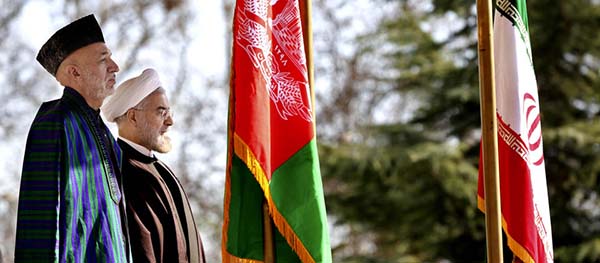Afghanistan and Iran have agreed to explore a mutual agreement on economic and security cooperation. During his visit to Tehran, President Hamid Karzai and his Iranian counterpart Hassan Rouhani agreed in principle to start negotiations for signing the bilateral cooperation agreement between Iran and Afghanistan. President Karzai’s trip to Iran has coincided with the increased tensions between Afghanistan and the United States over the bilateral security agreement between Kabul and Washington. It also takes place after public objections from Iranian officials to the Afghanistan-US security agreement which would allow a residual of forces of the US stay in Afghanistan.
President Karzai’s move to start negotiation with Tehran over a pact of cooperation and the timing of his trip were puzzling for many. In recent weeks, Iranian officials have sharply opposed with the security agreement between Afghanistan and the United States, and in one instance, criticized the Afghan government for entering the bilateral agreement with the United States. Karzai’s trip suggests that Afghanistan is attempting to enter into strategic cooperation with the two arch-foes simultaneously. It is a contradiction, though, that how the Afghan government is going to manage between allying with both Tehran and Washington while Iran and the US will have conflicting interests in Afghanistan beyond 2014.
On one hand, Afghanistan knows well that it needs to handle delicate relations with powerful neighbors including Iran. On the other hand, the question remains that how Afghanistan is going to manage between direct security and economic involvement of both Tehran and Washington in the country after the NATO mission ends by end of 2014. According to Afghan officials, the pact that Tehran and Kabul is exploring would include cooperation on security and economic developments. However, though it may be to some extent a symbolic agreement between the countries, it cannot be ignored that it will still result to involvement of Iran in Afghanistan’s affairs after 2014 particularly in security which would remain highly sensitive for the United States.
Afghanistan’s outreach to Iran to assure its powerful neighbor that a security pact between Kabul and Washington would not be against its interests is somehow understandable. Afghanistan needs to seek a logical balance in its foreign policy and maintain relations with its neighbors. The question that particularly remains in question is that weather it was the right time to begin negotiations with Iran over a pact on economic and security cooperation between the two countries. While maintaining a rapport with Iran is in interests of Afghanistan, exploring a pact of cooperation with it does not seem to be well justified. Iran has continued to pursue a double standard policy towards Afghanistan in last twelve years. It has had warm relations with the Afghan government while trying to help anti-NATO terrorist outfits operating in border areas.
However, to start exploring a pact of friendship with Tehran particularly at a time when Kabul and Washington are at loggerheads is questionable. It may also be a move by Karzai to tweak Washington and suggest tacitly that he is leaving all options open when it comes to reaching out to Afghanistan’s neighbors and the regional powers. Given Washington’s recent silent resistance against Karzai’s demands, it seems that the Obama administration is not going to rethink on its position regarding the security agreement between Afghanistan and the US.
While the fate of US presence in Afghanistan remains in limbo, beginning to explore a pact of friendship with Iran will not help to resolve the impasse between Kabul and Washington over the much-needed security agreement. For sure, Washington must have been anxiously watching Karzai’s outreach to Iran and the agreement between Iranian and Afghan leaders to start negotiations on a bilateral security and economic deal. By any calculations, this is not a good sign for the ongoing negotiations between Afghanistan and the United Sates and will affect the long-term relations between Afghanistan and the US. While US long-term support and cooperation is critical for Afghanistan’s stability, this move will further exacerbate the tensions between Kabul and Washington. The United States is already frustrated with the Afghan government over many issues, and the move would only compound to US exhaustion of the US from the Afghan mission.
Risking a long-term cooperation between US and Afghanistan is not affordable for Afghanistan at current time. If it is not a case of risking Afghanistan’s partnership between Kabul and Washington, at least it could be a threat to an extensive and robust mutual cooperation between Afghanistan and the United States. Entering a bilateral cooperation agreement at the cost of robust and sustainable relations with the US which would be crucial for Afghanistan’s economic and security development is not wise. With the intense standoff between Afghanistan and the US over the security agreement, the Afghan president was expected to deliberate more on his trip to Tehran and particularly its timing and negative publicity regarding the Kabul-Washington agreement.
However, the Afghan government needs to maintain rapport and a friendly relation with Iran. Though Iran has been involved in meddling in Afghanistan’s internal affairs and sabotaging its relations with the international community, it has also been one of the main supporters of the Afghan state in the last twelve years. The Afghan government’s attempt to establish friendly ties with Iran is understandable. However, any move for establishing relations with neighboring countries and regional powers should not come at expense of a long-term and robust economic and security cooperation between Afghanistan and the United States.

